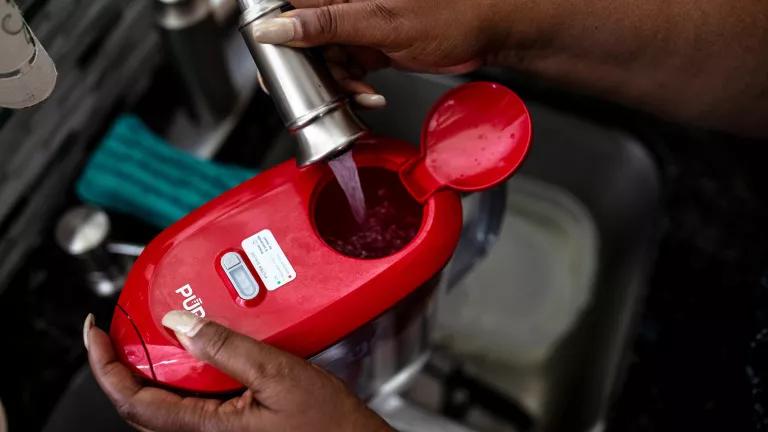Though Latest Newark Test Results Are Encouraging, NRDC Says “Trust But Verify”
The fight for safe water for all of the city’s residents continues on.

A Newark resident uses a PUR water filter before using the tap water from her sink.
The fight for safe water for all of the city’s residents continues on.
In the midst of Newark, New Jersey’s ongoing drinking water crisis, state officials and Mayor Ras Baraka announced today that new testing results show that 97 percent of currently installed water filters are effectively removing lead. That rate increases to 99 percent when combined with flushing the water for five minutes.
“NRDC is encouraged by reports that testing indicates that filters can work,” says Erik D. Olson, senior strategic director of Health and Food at NRDC, which, alongside the Newark Education Workers (NEW) Caucus, filed a lawsuit against the city over dangerously high lead levels in its drinking water. “However, we remain deeply concerned that previous testing found that some of the filters didn’t remove lead as advertised.”
Public health advocates argue that the testing protocols and results should be made available to the public. “We say ‘trust, but verify,’” Olson says. “Anything less than full transparency will breed further distrust and skepticism. There also is an urgent need to ensure that all filters are properly installed, maintained, and operated, with in-person instructions.”
The latest tests—done by the city of Newark and the New Jersey Department of Environmental Protection, reportedly with help the federal EPA—were in response to initial inspections that showed the distributed water filters may not adequately block lead in all cases, which triggered the distribution of bottled water.
Newark’s drinking water crisis has now continued for two and a half years. An inadequate response—including initial public denials of the problem and failure to act on early warnings—left thousands of residents exposed to the toxic heavy metal, of which there is no safe level of exposure. Children are particularly vulnerable to lead’s effects, which include lasting damage to developing brains, cardiovascular and kidney problems.
“Until this is sorted out, we urge the continued provision of bottled water to all at-risk Newark residents,” Olson says.



